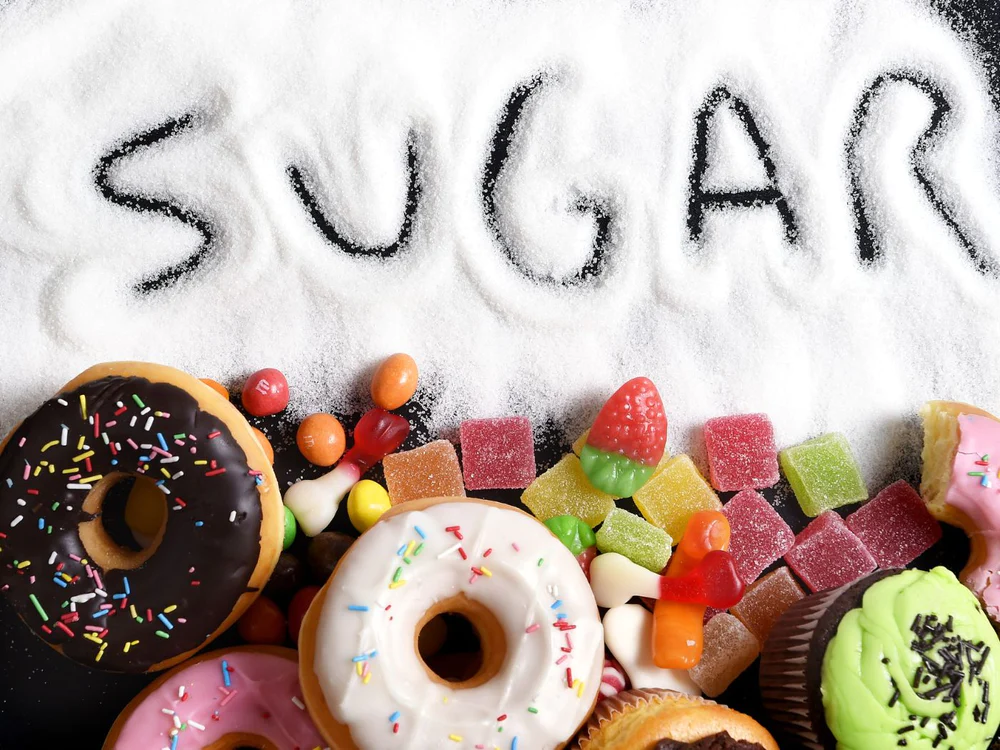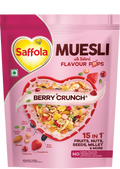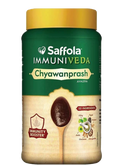8 January, 2024

10 min

43

Sugars are considered to be the villains in the life of many but in reality, that’s not always true. There are a lot of myths about this soluble carbohydrate (sugar). Before we debunk these myths let’s understand the science of sugar.
- 5 Common Sugar Myths
- Understanding Sugar and Health
- Unveiling Hidden Sugars
- Tips for Sugar Reduction
- FAQs on Myths of Sugar Consumption for Optimal Health
The Science of Sugar
Sugar is nothing but a soluble carbohydrate found as simple sugars or compound sugars. Simple sugars or monosaccharides consist of glucose, galactose, and fructose. Glucose and fructose are commonly found in honey and various fruits, whereas galactose is commonly found in dairy products and milk. Additionally, glucose is also found in vegetables.
Coming to compound sugars. Compound sugars or polysaccharides mainly consist of maltose, sucrose, and lactose. Maltose is commonly found in barley, lactose is found in milk, and sucrose (a combination of glucose and fructose) is commonly used or known as table sugar.
Sugar being a carbohydrate provides the body with energy. As per the experts, if 10% of your total energy per day comes from sugar, it’s said that you have a moderate sugar intake.

5 Common Sugar Myths
You cannot get addicted to sugar or sugary foods
- Have you ever thought about why you want to have one more cookie or another spoonful of ice cream after the first one? That’s because sugar when in your system acts like a reward to your brain. It releases dopamine which makes you feel good and makes you want one more cookie or your favourite sugary food.
Sugars present in the fruits are bad
- The sugars present in fruits are natural sugars. These sugars are absorbed in the body at a slower pace as compared to added sugars or other forms of sugar. Whole fruits are a good source of nutrients, vitamins, and minerals which benefit our body in several ways.
Children tend to get hyperactive on consuming sugar
- A lot of people believe that sugar and sugary foods make children hyperactive. But there isn’t any scientific evidence that can prove that this is true.
Sugar consumption is bad for your oral and dental health
- Every cavity or damage to the enamel is considered to be the sugar’s fault. But that’s not completely true. Although excess consumption of foods containing sugar is supposed to be avoided to prevent oral or dental problems, maintaining healthy oral and dental health is even more important to prevent these problems and to allow you to consume a limited amount of sugar freely.
Sugar must be completely avoided, especially when suffering from diabetes
- That’s not true. Sugar has an active role in various functions of the body, a moderate consumption of sugar is absolutely fine.

Understanding Sugar and Health
Where sugar is required by the body to provide energy and support various functions of the body, excess consumption of these added sugars has shown evidence of association with several health issues. A few of them include
Rise in blood pressure
- It’s seen that when an individual consumes an excess amount of sugar it leads to an increase in the insulin levels in the body, this, in turn, leads to activation of the sympathetic nervous system which leads to an increase in the blood pressure as well as the heart rate.
Weight gain
- Evidence has shown that individuals who have too much consumption of sugar can have weight gain over time. These sugars could be in the form of added sugars, or hidden sugars.
Heart diseases
- High consumption of sugar has shown an increase in the risk of heart disease and heart attacks (strokes) in individuals. This happens when the sugars tend to increase chronic inflammation and also lead to a rise in blood pressure.
Liver disease
- Excess consumption or daily consumption of refined sugars can lead to liver diseases. This happens due to the chemical that builds up in the body which affects the liver and also causes fat to build in the liver (fatty liver).
Diabetes type-2
- We all know excess sugar intake leads to diabetes but additionally, Individuals that have prolonged consumption of excess amounts of sugar can also make the individual resistant to insulin.
Besides this, excess sugar intake is also linked with problems like acne, skin aging, cellular aging, and an increased risk of developing depression, dental problems, and kidney disease.
Unveiling Hidden Sugars
Most of us believe that sugars are only found in sugar foods like cakes, pastries, chocolates, candies, and aerated drinks. But that’s not all. There are hidden sugars in various other food products that a lot of us are unaware of. A few of these products are:
- Ketchup or tomato sauce
- Instant oatmeal
- Syrups
- Fruit purees
- Granola bars
- Salad dressing
- Pasta sauce
- Energy drinks
- Packed fruits
- Breakfast cereals
- Ready fruit juices
- Bread
- Nut butter
- Barbeque sauce
- Ready-to-eat soups
- Packed foods
- Ice tea
The overall idea is to read what’s in your food product and choose them wisely.

Tips for Sugar Reduction
Anything that’s done within limits is fine. A few tips or Strategies for reducing sugar intake include:
- Limit the intake of drinks that are high in sugar like iced tea, energy drinks, etc.
- Replace sugar desserts with whole fruits or dark chocolate.
- Avoid excess consumption of ketchup, salad dressing, and other sauces that contain hidden sugar.
- Prefer home-cooked foods over packed or processed foods.
- Consume more whole foods as they do not contain additives and other ingredients that can have a negative effect on your health.
- Keep a habit to read the labels on the food packs and look out for any kind of sugar or hidden sugar in them.
- Ditch sugar-containing breakfast cereal to low-sugar or sugar-free breakfast cereals.
- Maintain a protein-rich diet that will help you manage your weight, reduce your appetite and also curb your unwanted cravings.
- Incorporate diabetic shakes in your routine to not only manage your sugar intake but also improve your overall health. The Saffola Fittify Hi Protein Diabetes Advansed Nutrition is a good option when it comes to diabetic shakes.
- Follow a healthy sleep routine and make sure you get enough sleep. This is because your sleep pattern also tends to have an effect on your food choices.
- Lastly, keep a habit of monitoring your sugar levels to make sure you alter your diet if required based on the same.
Conclusion
Not all sugars are bad for your health. The idea is to know the myths and facts about sugar and also understand which sugars are good and which sugars are harmful to your health. Additionally, it’s also very important to know about foods that have hidden sugars in them that can also affect your health and incorporate them accordingly into your diet. With a few simple tips to have a controlled sugar intake, you can easily stay away from various health problems associated with high consumption of sugar.
FAQs on Myths of Sugar Consumption for Optimal Health
Is all sugar bad for my health?
Moderate sugar consumption as such isn’t bad for your health, but excess consumption or daily consumption of sugar can affect your health and overall well-being.
How does sugar affect my weight loss and body composition?
- Prolonged consumption of an excessive amount of sugar can lead to weight gain and an increase in body fat. Additionally, this can also lead to an increased risk of other health problems like diabetes, cardiac problems, etc.
Does sugar consumption always lead to diabetes?
- Sugar isn’t the culprit for diabetes but excess consumption of sugar for a prolonged period of time can make the person insulin resistant and increase the risk of or cause diabetes.
Does sugar consumption cause tooth decay?
- Sugar consumption does affect oral and dental health but if the sugar is consumed in limited quantities and good dental and oral hygiene is maintained with regular brushing of teeth, flossing, tongue cleaning, and dental check-up, tooth decay can be prevented.
Are artificial sweeteners a healthier alternative to sugar?
- Artificial sweeteners are considered to have harmful effects on health that are similar to sugar. There is evidence that the daily use of artificial sweeteners increases the risk of cardiac disease and they are also addictive.












